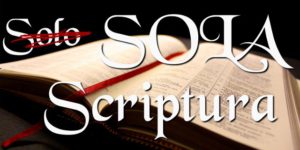 What is Biblicism?
What is Biblicism?
To be Protestant is to believe in biblical authority. However, biblical authority and biblicism are not synonymous. Biblicism moves beyond believing in the final authority of the Bible to imposing a restrictive hermeneutical method onto the Bible. Biblicism can be identified by the following symptoms:
(1) Ahistorical mindset: Biblicism is a haughty disregard (chronological snobbery in the words of C. S. Lewis) for the history of interpretation and the authority of creeds and confessions, chanting an individualistic mantra, “No creed but the Bible,” which in practice translates into “No authority but me.” Sola scriptura is radicalized into solo scriptura. As a result, biblicism fails to let theology inform exegesis, which is designed to guard against heresy.
(2) Irresponsible proof texting: Biblicism treats Scripture as if it is a dictionary or encyclopedia, as if the theologian merely excavates the right proof texts, chapter and verse, tallying them up to support a doctrine. Biblicism limits itself to those beliefs explicitly laid down in Scripture and fails to deduce doctrines from Scripture by good and necessary consequence. Continue reading “Sola Scriptura (Scripture Alone) Does Not Mean Solo Scriptura (Scripture Only – Biblicism)”

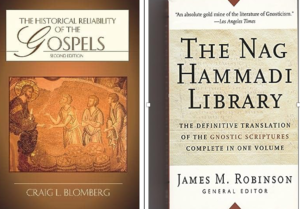 Question: But critics like Elaine Pagels & Bart Ehrman argue that this traditional history of orthodoxy is skewed because it grants greater authority to the canonical gospels and ignores the other (gnostic ) gospels. Why do you think the canonical four gospels provide more accurate historical information about Jesus than the gnostic gospels?
Question: But critics like Elaine Pagels & Bart Ehrman argue that this traditional history of orthodoxy is skewed because it grants greater authority to the canonical gospels and ignores the other (gnostic ) gospels. Why do you think the canonical four gospels provide more accurate historical information about Jesus than the gnostic gospels?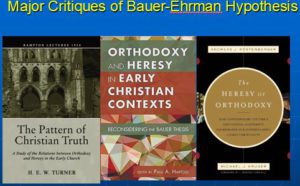 Question: Many secular university scholars argue that there was diversity of Christian beliefs in the early church as different sects competed with one another for influence. When the sect in Rome gained power it declared itself orthodox and condemned the other sects like Gnosticism to be heretical. What is your response?
Question: Many secular university scholars argue that there was diversity of Christian beliefs in the early church as different sects competed with one another for influence. When the sect in Rome gained power it declared itself orthodox and condemned the other sects like Gnosticism to be heretical. What is your response? A. Bauer-Ehrman Revisionist History – “Heresy Preceded Orthodoxy”
A. Bauer-Ehrman Revisionist History – “Heresy Preceded Orthodoxy” Bart Ehrman’s primary mission in life is undeniable. It is to discredit Christianity and to deconvert Christians from their faith. Ehrman’s attack on Christianity has been effective because he claims to be speaking as an objective historian (which is debatable), in contrast to apologists and theologians defending their faith and because he is speaking as a lapse fundamentalist with insider-knowledge. Ehrman’s attack on Christianity is comprehensive, but I shall only highlight three of his favorite lines of attack on Christianity.
Bart Ehrman’s primary mission in life is undeniable. It is to discredit Christianity and to deconvert Christians from their faith. Ehrman’s attack on Christianity has been effective because he claims to be speaking as an objective historian (which is debatable), in contrast to apologists and theologians defending their faith and because he is speaking as a lapse fundamentalist with insider-knowledge. Ehrman’s attack on Christianity is comprehensive, but I shall only highlight three of his favorite lines of attack on Christianity.  Former church turned into a bar
Former church turned into a bar



